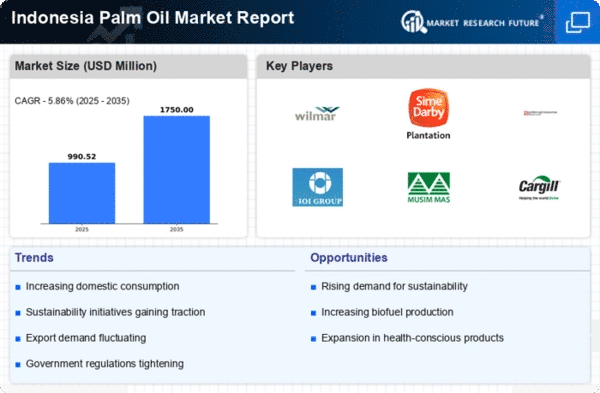Rising Demand for Biofuels
The palm oil market in Indonesia is significantly influenced by the increasing demand for biofuels. As countries seek to reduce their carbon footprints, palm oil is increasingly viewed as a viable feedstock for biodiesel production. In 2025, it is estimated that biofuels derived from palm oil will account for nearly 15% of Indonesia's total energy consumption. This growing demand is likely to drive investments in the palm oil market, as producers look to expand their production capabilities to meet both domestic and international needs. The potential for biofuels to contribute to energy security further underscores the importance of this driver.
International Trade Dynamics
The palm oil market in Indonesia is heavily influenced by international trade dynamics. As one of the largest producers of palm oil, Indonesia exports a substantial portion of its output, with approximately 70% of production destined for foreign markets. Trade agreements and tariffs can significantly impact the competitiveness of Indonesian palm oil on the global stage. In 2025, the market is expected to see fluctuations in export volumes due to changing trade policies in key importing countries. This could lead to increased volatility in prices, affecting the overall stability of the palm oil market. Producers must navigate these complexities to maintain their market position.
Regulatory Framework Enhancements
The regulatory landscape surrounding the palm oil market in Indonesia is evolving, with the government implementing stricter environmental regulations. These regulations aim to promote sustainable practices within the industry, potentially increasing the demand for certified sustainable palm oil. As of 2025, approximately 30% of palm oil produced in Indonesia is certified sustainable, reflecting a growing trend towards environmentally responsible production. This shift may encourage producers to adopt better practices, thereby enhancing the overall reputation of the palm oil market. Furthermore, compliance with these regulations could lead to increased market access, particularly in regions where sustainability is a key purchasing criterion.
Consumer Awareness and Ethical Sourcing
Consumer awareness regarding ethical sourcing is becoming a pivotal driver in the palm oil market in Indonesia. As consumers increasingly demand transparency in supply chains, companies are pressured to ensure that their palm oil is sourced responsibly. This trend is reflected in the rising number of brands committing to using sustainably sourced palm oil, with estimates suggesting that by 2025, over 50% of major food brands will have adopted such policies. This shift not only influences purchasing decisions but also compels producers to adapt their practices to meet these expectations, thereby enhancing the overall integrity of the palm oil market.
Technological Innovations in Cultivation
Technological advancements in cultivation practices are reshaping the palm oil market in Indonesia. Innovations such as precision agriculture and improved seed varieties are enhancing yield efficiency and reducing environmental impact. As of 2025, it is projected that these technologies could increase average yields by up to 20%, thereby boosting overall production levels. This increase in efficiency not only supports the economic viability of the palm oil market but also aligns with sustainability goals. By adopting these technologies, producers can potentially reduce costs and improve profitability, making the market more attractive to investors.


















Leave a Comment